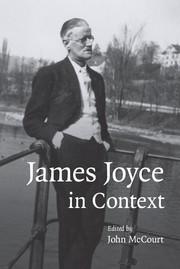Book contents
- Frontmatter
- Contents
- Notes on contributors
- Preface
- List of abbreviations
- PART I LIFE AND WORKS
- PART II THEORY AND CRITICAL RECEPTION
- PART III HISTORICAL AND CULTURAL CONTEXTS
- 14 Being in Joyce's world
- 15 Dublin
- 16 Nineteenth-century lyric nationalism
- 17 The Irish Revival
- 18 The English literary tradition
- 19 Paris
- 20 Trieste
- 21 Greek and Roman themes
- 22 Medicine
- 23 Modernisms
- 24 Music
- 25 Irish and European politics: nationalism, socialism, empire
- 26 Newspapers and popular culture
- 27 Language and languages
- 28 Philosophy
- 29 Religion
- 30 Science
- 31 Cinema
- 32 Sex
- Further reading
- Index
27 - Language and languages
Published online by Cambridge University Press: 14 July 2009
- Frontmatter
- Contents
- Notes on contributors
- Preface
- List of abbreviations
- PART I LIFE AND WORKS
- PART II THEORY AND CRITICAL RECEPTION
- PART III HISTORICAL AND CULTURAL CONTEXTS
- 14 Being in Joyce's world
- 15 Dublin
- 16 Nineteenth-century lyric nationalism
- 17 The Irish Revival
- 18 The English literary tradition
- 19 Paris
- 20 Trieste
- 21 Greek and Roman themes
- 22 Medicine
- 23 Modernisms
- 24 Music
- 25 Irish and European politics: nationalism, socialism, empire
- 26 Newspapers and popular culture
- 27 Language and languages
- 28 Philosophy
- 29 Religion
- 30 Science
- 31 Cinema
- 32 Sex
- Further reading
- Index
Summary
‘It is difficult to enjoy well so much several langages’: the wisdom of English as She Is Spoke radiates from its own exemplary nature. It lists ‘Chinaman’ as a trade and ‘Hedge hog’ as a fish, suggests a phrase like ‘You hear the bird's gurgling?’ as respectable small talk, and proffers such inscrutable proverbs as ‘To craunch the marmoset’. The poor youth (‘at which we dedicate him particularly’, notes the Preface), who goes with such a guide in hand runs a good risk of being institutionalised – whether as felon, patient or tenured professor I leave the reader to imagine. First published in London the year after Joyce was born and repeatedly re-issued since as a comic treasury, this book provided ready material for Finnegans Wake, from specific words like ‘idiotism’ (299F3) to, most explicitly, the title Storiella as She Is Syung.
Joyce's interest in this unusual volume stems from a keen awareness of the volatile differences between the two general conceptions of language that Saussure designated as the homogeneous langue and the heterogeneous parole. Where the former is a theoretical construct, the latter is experience, and their mutually defining animadversions are dramatically and regularly exchanged in letters to newspaper editors that quibble ferociously over the use of a split infinitive or a troublesome apostrophe. The unintentional hilarity of English as She Is Spoke is the result of a collision of categories: idiolect presuming to be normative.
- Type
- Chapter
- Information
- James Joyce in Context , pp. 309 - 319Publisher: Cambridge University PressPrint publication year: 2009



